The sun had already set as I followed the road through the cluster of houses at the base of Axalp. Happy laughter came from the hikers hovered around the dim lights of the food truck serving coffee and hot chocolate with shots of schnapps. I trudged forward, one step after the other. I needed to get the shuttle bus. Then I could collapse. Not far now. A soldier walked towards me, staring into my face. I ignored him.
“Do you speak German,” he asked me in German.
“Yes.” I had no interest in talking to him, no curiosity as to why he had approached me. Trudge. Trudge. Trudge.
“Are you injured?” A sudden spotlight blinded me. He was shining his flashlight into my face. Jarring. I blinked rapidly, disoriented, wanting the bright light to go away.
“No. I’m just very, very slow.” He lowered the flashlight and I made eye contact. He had big brown eyes that looked kind. I kept walking.
“It’s just we received a report about a woman on her own still coming down the mountain.”
“Yes,” I said. “That’s me. It was me. I’m here now.”
“And you aren’t hurt?”
“No I’m not hurt. Well, everything hurts. But I’m fine.” Just let me get to the bus, trudge, trudge, trudge.
“I’ve got her,” he shouted. Only then did I notice the group of camouflaged men standing at the side of the road with flashlights and headlamps. Military. They stopped talking and clustered around me. The kind-brown-eyed soldier said something in Schwizertütsch (Swiss German) that I didn’t understand.
“We were just coming to find you because we heard you were still out there,” he said in a voice one usually reserves for small children, looking me up and down once more.
“I’m fine,” I said, again. They could stop worrying. I kept walking.
The morning had started at 5am with a hearty Continental breakfast. My backpack was filled with bread and cheese and nuts and a litre and a half of water in my hydration pack. I was ready!
The Axalp Fliegerschiessen Airshow is an amazing flight demonstration at the Ebenflüh Shooting Range above the high alpine pasture of Axalp. This is not a traditional airshow but a live-fire training exercise for the Swiss Air Force. The command post (KP) is at the top of a ridge overlooking the shooting range, allowing spectators to watch the show from 7,500 feet.
VIPs are airlifted up by helicopters who ferry the guests up from the Meiringen Air Base to KP all morning long in preparation for the airshow at 2pm. For the rest of us, it is a “challenging” hike that, depending on the website, takes from one to four hours for a fit and healthy person. There were a lot of additional terms that I didn’t really understand: altitude acclimatization, 700 vertical meters, 55%+ incline. There were thousands of people attending, how hard could it be? Far more important was that the Swiss military had airlifted in toilets and beer and cheese.
The Tschingel spectator area is at 7,250 feet, which sounded quite a respectable height. Still, obviously I could make it, as long as I left myself enough time. I may not be physically fit but I have stamina. What could possibly go wrong?
Which was why I was at the train station before dawn for the ride to the parking area at the edge of town, where we were herded into holding pens as buses pulled up for loading. I knew why I was here: I had allowed almost eight hours to hike up to the spectator summit. But why were the rest of them up so early?
For this first day, technically the practice run, I’d managed to secure chairlift tickets. They sold out almost immediately, even though every guide said that they weren’t worth it because you still had to do the steep climb, the chairlift just cut out some of the easier walking at the start. What the guides didn’t say was that using the chairlift committed you to the roughest ground and the steepest possible ascent.
It wasn’t until I was paired with another single for the ride up the mountain, a grumpy looking man, that I remembered how much I hated chairlifts. When I was growing up, we would go skiing every winter and I always needed help getting on and off. The risk of somehow falling into the chair and being hauled up a mountain upside down, dangling by my ankles from the mechanisms, always seemed a very real risk. Worse, if you looked incompetent, they would stop the whole chairlift and a large man, usually rolling his eyes, would help you get on while everyone else wondered why the lift had stopped. And even once you were sitting down, there was the constant peril of dropping a glove or worse, a ski pole, and your father making a big fuss of how you just needed to take care of your goddamn stuff and he wasn’t spending money getting you a replacement, you were just going to have to spend the rest of the week with one glove or worse, one ski pole, and maybe if you were lucky you’d get a new set at Christmas.
And now I was expected to take off my backpack, filled with water and food and a blanket and battery packs, and hold onto it while I looked behind me for a rapidly approaching chair while a grumpy man with whom I had not yet made eye contact sat heavily into it which meant that as I stepped back, the chair was a good three inches lower than it had been half a second ago.
I hugged my backpack and launched myself backwards, earning a surprised exclamation full of umlauts from grumpy man as the chair rocked violently back and forth. I clutched my backpack as if my life depended on it and stared resolutely straight ahead.
A large man helped me off the chairlift at the top, only shouting at me a little. And then there we all were, in the dark on a mountain. A glimmering string of headlamps snaked away to the silhouette of a distant ridge, where the miniature lights climbed up like glowing ants. The terrain was rough and pockmarked, with no clear trail. I had not yet started walking but I was already breathing heavily. I attached my headlamp, which immediately twisted and pointed in a random direction. I’d picked it up at the supermarket a few days before and was learning quickly that this is one of those cases where you get what you pay for. I held it in my hand, pointing it at the rough earth, and started up the hill.
Every few minutes I stopped to catch my breath and watch the low-hanging stars over the looming shadows of the mountains. The early morning hike was worth it for this alone, I thought, and then I pointed my lamp at the ground again and prayed that I didn’t break an ankle.
I was clearly out of my league. Everyone else was dressed in high-end fitness gear and using trekking poles while I rocked up in two sets of thermal underwear covered with jeans and a sweatshirt and Cliff’s old raincoat. Every few minutes, I stepped to the side to let people pass, panting like an oversized dog on a hot summer’s day. I smiled politely at the people hiking past me and they smiled back. It wasn’t like I was trying to win a race. I just needed to keep going. I kept going.
Dawn was fast approaching. The line of tiny lights inching up the ridge turned into silhouettes as the stars disappeared and unbelievably, the view became even more spectacular. It was truly magical, other than the fact that I couldn’t breathe.
It was already obvious that I wasn’t actually in good enough shape for this escapade. I have lived at sea level all of my life. I am overweight and undermotivated and I sit at a desk all day. The only thing I had going for me was stubbornness.
Eventually, I reached the first rest point: a flat piece of land before the ridge with a first aid station and a cluster of blue plastic portable toilets. I took the opportunity to shed a few layers of clothing and repack my bag and then started zig-zagging my way up the hill.
I had to stop to catch my breath every zag but with the steady stream of people passing, no one noticed how much I was struggling. By now, the first wave of hardcore hikers had all passed me; the second wave was the photographers lugging heavy backpacks bulging with equipment and stabbing the high ground with their trekking poles the way a rock climber uses an ice axe.
Just as I was thinking oh thank god, I’m almost there I was confronted with a spiky temporary metal stairwell. The top of the ascent was still somewhere high above me: the stairs curved around out of sight. It was a marvel of engineering and even in my damaged state, I could see that stairs were less risky than climbing up the steep terrain but, convinced that I was almost finished, it felt like heartbreak. A constant stream of hikers passed me, chatting to each other in happy Swiss-German that I couldn’t understand. Was all of Switzerland composed of incredibly fit men and women?
They clustered at the top of the stairs and finally, truly, the end was in sight. I steeled myself to take the last dozen steps of the stairs. But as I stepped onto the muddy plateau, another impossibly steep slope came into view.
“Fuck you,” I thought, or maybe even said out loud. I sat down on a rock and took my backpack off. I was staying here.
I wasn’t the only one, others had stopped and were standing or sitting nearby. But as I looked around at my potential allies, I realised they weren’t settling in to stay. They were staring at the next slope with steely gazes of determination.
I followed those gazes to the top of the mountain where a line of plastic blue portable toilets stood sentinel. There were no trees at this height, no shelter of any kind, and my bladder was just starting to alert me that even though the sweat was dripping down my entire body, I had drunk at least half of my water and those toilets up there looked awfully useful.
But also, honestly, if the airshow was up there, how could I possibly stay down here, listening to the jet engines roar without being able to see a goddamn thing. If I didn’t climb that mountain, then why was I even here? I had no choice.
If I’d spent more time with the map, I would have realised that I had reached Brau, one of the three official viewing areas, and I could in fact stay where I was and still see the airshow. If I’d explored the area, I would have found a small congregation of portapotties on the other side of the plateau. If I’d thought about it being just the first day of three, I could have called a halt to things there and tried again the following day. But I didn’t consider any of these things because my entire world was centered on this steep slope in front of me and that I was going to need every bit of stamina and willpower that I had in order to keep going and climb up it. I was going to get up there if it killed me.
Note that at no point did I consider that I would also need to get down.
I probably shouldn’t bore you with the rough ground, the deep troughs and crumbling ledges of the terrain, the zigging and zagging along the incline with thigh muscles that felt like they’d been stretched beyond any hope of recovery. But if I had to live through it, the least you can do is read about it. The earth was soft and slippery at points where other people had kicked off the top layer of crumbling sod. A line of strong-muscled souls followed a narrow channel. I tried to follow them. It was steep and uneven with rocks and slippery mud. My knees creaked. The man behind me quickly became impatient and muttered that I should get the hell out of the way so he could make it up the mountain sometime before sunset. I abandoned the channel and went back to weaving my way back and forth across the slope.
The sun was high in the sky and I stripped off another layer. Stopping to rest was quite enjoyable as I watched the people below me scrambling up the mountain. There I was, on a mountain, in the Alps, the bright sunshine warming my face. I took off my backpack and found my sunscreen and a piece of bread. Then I put my backpack back on and ignoring my aching lungs, I trudged up another few feet.
Suddenly, a monstrous roar. I instinctively put my hands over my ears. A fighter jet appeared over the ridge. I turned to keep it in sight and toppled onto the turf with a bump. A bright red aircraft sped past in hot pursuit. For a moment I wondered if I was too late, if the airshow had begun, but no, it was not quite 10. A practice run before the first day. Maybe, I thought, they were only flying by to motivate us to keep going. It was working. I stood on shaking legs. Two more jets scrambled past. I threw myself back onto the slope, afraid I’d tumble down the mountain if I tried to watch.
Then it was silent except for the lower rumble of the helicopters taking the VIPs to the top filled the air. I put my phone away and stood up again …but this time I had a grin on my face.
The next stage of the hike took over an hour, mostly because I flung myself to the ground every time an aircraft roared past, with barely a thought for the now-squished bread in my backpack. People hiked past me with determined looks on their faces, ignoring the impromptu display. I wondered if I could just stay here. It wasn’t unpleasant and I’d be able to see at least some of the show. My bladder reacted with a panicked twinge and I realised that no, I really was going to have to continue.
I zigged and then zagged and zagged and then zigged until at long last I was at the top, with the long line of bright blue portapotties as a welcome. I took care of urgent business and looked around to see where I was. Directly in front of me were three four-way urinals with men relieving themselves at each station, which went a long way to explain why the toilets were still clean and useable.
I made eye contact with a man zipping himself up and quickly turned away, walking to the edge. The lake shimmered turquoise below me. It seemed incredible that I had started my morning down there, in the tiny little buildings of the tiny little lake town. A Super Puma rumbled past. I limped past the airlifted crates of food and beer and treated myself to a second breakfast.
Loudspeakers blared Latin American pop songs. People sat on blankets, talking and drinking and even making fondue. I had almost two hours before the airshow was due to start. I sat down on my blanket, digging my heels into the earth to keep from sliding down. Then I lay flat and fell asleep.
A voice on the loudspeaker woke me up to announce the start of the airshow. It was amazing, spectacular, better than my wildest dream. We all stood on the slope, jumping up and down with excitement and glee (ok, maybe that was just me) as the military gave us a display of their finest mountain flying.
The Patrouille Suisse, the Swiss Air Force display team, appeared to Kenny Loggin’s Danger Zone blaring on the loudspeakers and I sang at the top of my lungs while spinning in place to see all the action. I wrote all about the airshow on Fear of Landing but at that moment, I did not regret a moment of that hike up or the fact that my legs had already stiffened into stone.
Then, the swarm of Super Pumas appeared to pick up the VIPs. The last shuttle bus was at 8pm, which gave me almost five hours to get down, miles of time, much more than I needed.
I made my way back to the descent and looked down. Perversely, down now looked more difficult than up.
The pockmarked terrain seemed even more treacherous as I struggled to find a safe route down. My muscles were on fire, my bad knee was beginning to twinge and my hips ached as if they were a hundred years old. The crowd surged past me, making good use of their poles, while I carefully picked my way down. I began to feel angry at my lack of poles, as if someone had done me wrong. I slipped and slided to the bottom of the first slope, where I collapsed on a moss-covered stone. I was tired and sore and my lungs hurt and I did not want to do this any more.
The metal spiked stairs and steep incline seemed like an impossibility. I was unsafe and I knew it. The fact that there was a first aid station at the bottom did little to reassure me. But then, after the first rush had passed, I noticed that most people were not heading to the stairs but instead were following a different trail which turned left and down the valley. Near the trailhead stood a group of boisterous men in camouflage shouting in Schwizertütsch, waiting for some unknown other. I was too tired to get up so I called out to them from my rock to ask them where the trail went. The eldest, a serious man in his forties said “Hoi, grüezi,” leaning towards me while making a motion to the others to shush.
I spoke in Hochdeutsch (Standard German). “Will that trail take me back to Axalp? Is it easier?”
He switched immediately. “Yes, definitely. It takes longer but it is the easier route.” The older man looked at me a bit dubiously. “But it’s still a little steep. The first section is a bit rough.” He seemed to realise there was no point in talking me out of it and brightened. “But once you are past that, it’s footpaths and roads the rest of the way. ”
They started down the trail and I fell in behind them. Soon, however, they were far in front of me as I balanced around the deep ridges formed over decades of the rain and snow. I kept my eyes firmly down, ensuring that my feet were planted on firm ground. “Just the first section,” I repeated to myself. “Once you are past that, it’ll be flat.”
Which was a nonsense, of course. That wasn’t what the man had said and I still had to lose a few thousand feet of altitude. But at least it wouldn’t be quite so perilous. And I had plenty of time, I reminded myself.
That is, until I abandoned the trail. I mean, it wasn’t much of a trail but it did technically exist and there were markers which I should have been watching for. But enough other people were passing me that I didn’t need to watch where I was going. I kept my eyes on the ground, determined not to twist my knee or break an ankle. There was no space for a rescue helicopter here. There would be no rescue.
The track evened out and became less distinct as I reached a cluster of farm buildings and my shoes began to sink in the mud. I finally dared look up and realised there were no people anywhere around me. There were no path markers or signs. The buildings were clearly abandoned. I was lost.
Not very lost, to be fair, with the trail behind me and steep slopes to my left and in front. A dirt road led downhill and I sure as hell was not going uphill again. I walked on. The dirt road reached a junction but before I could panic, two fit-looking hikers came into view from my right. One gave me a curious look and helpfully pointed at the trail marker which showed another right turn. I’d added maybe half an hour and a bit of mud to my route but the important thing was that I was back on the trail.
The men wished me a good day in Schwizertütsch and then disappeared around the bend with their fancy poles. A helicopter passed overhead, returning to the top of the trail. I stopped to watch it drop a rope with a man on it and then land nearby. A moment later the helicopter returned to pick up a person-sized flat cot or maybe a coffin. Someone was being flown down the mountain. I was glad it wasn’t me.
The trail turned into flat fields turned to a dirt track and I started to feel more confident that I might, in fact, make it down in one piece. I tried to imagine a soundtrack in my head, as if I were in a Rocky film, training for my final battle, but I was too tired to carry a tune, even mentally. Soon, I was on a paved road. The sound of many voices greeted me as I approached a long building along the side of the road. Someone had set up tables with bubbling stew and bottles of beer, and happy lycra-clad people who owned trekking poles sat at picnic tables and had their fill. I could not face food and there was no universe in which it was sensible to have a beer. Besides, if I sat down, I would never, ever get up again. I passed a sign that said 30 minutes to parking at Axalp. My momentary glow of excitement quickly abated when I realised they probably meant by car. Still, I thought I could walk on a paved road for another hour, if I needed to, without falling flat on my face. I ignored the sounds of people laughing and drinking beer and having fun without me. I kept walking.
The road curved around the mountain to a stunning view of Lake Brienz. It still looked impossibly far away, too far to be able to imagine myself safe at my bed and breakfast. I took a photograph — the only scenic photo that I took on the way down — and carried on walking.
And the story would probably end there, with me trudging along the road until I made it to the shuttle bus, if I hadn’t seen the sign.
It said Axalp, which should of been good news, but the sign pointed away from the road, towards a footpath meandering down a grassy hill. I looked at the sign. I looked at the road. I desperately wanted to stay on flat asphalt until I was back in Brienz. But what if the road went somewhere else first? What if, horror of horrors, it went up? Surely, I thought, there must be a reason for this sign recommending that I leave the road.
I glared at the sign and then, too tired to argue, I followed the trail. It was not so bad at first, the grass was down-trodden and the slope was not so steep. But then I reached a barrier, again marked with a clear sign that this was the trail to Axalp, and not a terribly challenging one at that. At least, not to a fitness-freak Swiss hiker with trekking poles. I spared a ;ast glance behind me to the road but it was now uphill. I was never going uphill again.
I raised the barrier and passed through.
The narrow trail snaked its way down a steep slope of rocks and across a stream before switching back towards a cluster of pine trees clinging on the incline for dear life.
Not far now, I told myself. If I just kept going, I could rest all day tomorrow. I would skip breakfast and the airshow and stay in bed all day long. Maybe both days. The sun was low in the sky. It was past six now. Would I miss the bus? Surely I wouldn’t miss the bus. I resisted the urge to stop and check my phone. By now, I was half chanting to myself to just keep going, keep watching, keep going, keep watching. I felt stupid, knowing that thousands of people had climbed up to the airshow and down again. It was hardly an Olympic feat. But I’d pushed myself so hard that morning, climbing farther and faster than I was really capable of, that now when it mattered, I had very little left to spend.
Civilisation seemed a long forgotten memory when I heard voices behind me. I turned to see two men wearing high-tech clothes and ultralight backpacks, planting their poles confidentially into the ground as they followed the switchback towards me.
I stepped out of the way so they could pass. As they reached me, I fell backwards into the rough grass, staring up at them like an overturned beetle. One of the men reached out to me.
I sat up, utterly defeated. “When you get down, can you tell them I’m here?” I forced my legs under me and took his hand to get up. “It’s just, I’m worried I’ll miss the last shuttle bus.”
“Oh don’t worry,” said the man with the hand. “You are almost there now! It’s only 15 minutes.”
I steadied myself. The sun was worryingly low in the sky. If I fell now among the pine trees, snapping my ankle like dried firewood, it would be impossible even for a helicopter with a man on a rope to get to me. Besides, I had no idea where I was. “I’ll keep going, ” I said. “But if you could tell someone where I am?”
“You’ll be fine,” he repeated. I looked down to brush off my jeans and when I looked up again, they had moved on.
Fifteen minutes was a bald-faced lie. They were still on the slope below me, reflective gear flashing between between the trees. The shadows began to merge into dusk. I should stop and get my headlamp out. But there was just enough light to see by. If I stopped, I might miss the bus. If I stopped, I would stop forever. I wondered if my blanket would offer enough shelter to spend the night.
I slipped again and fell, grabbing a pine tree branch to stop myself from sliding down a carpet of rotting pine needles. I clung to the branch for a moment as if it might save me before pulling myself up to continue. My self-talk had reduced to a few syllables. “Just walk. Don’t fall. Just walk. Don’t fall. Just walk. Don’t fall.”
Thirty minutes passed, and then forty-five. I could no longer see the men in front of me. I had no idea how much further it was, if Axalp even existed anymore.
The trees opened up to a wide grassy slope leading to the paved road. If I fell now, I would tumble down into the street and someone could pick me up and carry me the rest of the way. Or a car could drive straight over me and put me out of my misery. A crowd of hikers with flashlights and headlamps appeared on the road, having clearly decided against the signposted footpath.
(The above photo was taken the following afternoon but shows that final stretch as taken from the paved road.)
There was no voice at all in my head anymore. I just kept walking, eyes down, watching where my feet landed. Trudge, trudge, trudge. That last stretch of grass to the road, which I would have considered a lovely grassy hill on a summer’s day, took me a further 15 minutes.
The road meandered through the village in S-shaped curves and the people with their headlights and trekking poles cut across the rough land for a shortcut. I did not. I was not leaving the paved surface again for any reason. I had a single objective: find the shuttle bus and climb into it and sit down and then I was done forever.
That’s when the man with kind brown eyes stopped me to ask me if I was injured. “I’m just very, very slow,” I said, and kept walking.
One of the soldiers asked something in Schwizertütsch and kind-brown-eyes repeated it into German that I could understand. “Where are you staying? How are you getting home?”
“I need to take the shuttle bus to Brienz.”
“I think you are too late.”
I stopped walking. “I was told they run until 8pm!” Tears pricked my eyes. If I’d missed the bus after all this, then I had no idea what to do.
The soldiers quickly agreed that my brown-eyed man, obviously not actually as kind as I had initially thought, was wrong. I could still get the bus.
“Tell me exactly where I need to go, please.” I did not want to walk past the stop or get lost or, god forbid, miss the last bus to Brienz.
Three of them gave me detailed directions, of which I understood precisely nothing other than that I was going in the right direction. I went back to one foot in front of the other. How hard could it be to find a bus?
Trudge, trudge, trudge. I was walking so slowly, I still hadn’t passed the search party which had congregated in the road around me. I suddenly realised I was being unspeakably rude. “Thank you,” I said, picking a soldier at random to address. “Thank you for your help and that you…if I were still up there, that you would have come…” I got lost in the grammar of the mixed conditional and trailed to a stop.
He blushed. “Of course,” he said. And then, as if a decision had been made, they drifted away.
Ahead of me, in a location that I felt certain was not where the soldiers had described, there was a bus. The driver and another man were talking in the doorway.
“Are you going to Brienz?”
“At half past seven, yes.”
I had no idea what time it was and I no longer cared. I’d made it.
But I was taking no chances. “Can I wait in the bus?”
Ten minutes later the bus driver returned and we left Axalp to make our way down the mountain. I was the only passenger. He told me that there was no point in changing at the car park; if I was staying in Brienz, he could take me all the way there. I nodded in relief and closed my eyes until he stopped the bus and told me that I needed to get out.
I made it into the bed and breakfast and took the elevator up to the second floor and threw my clothes onto the floor and crawled into bed. And I remember nothing more until I heard the sounds of the town waking up the next morning.

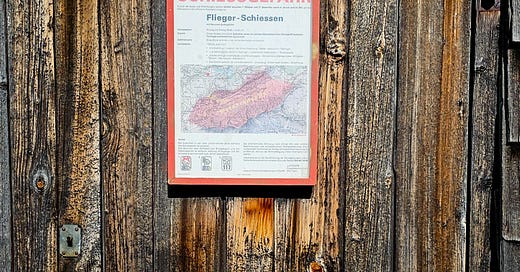



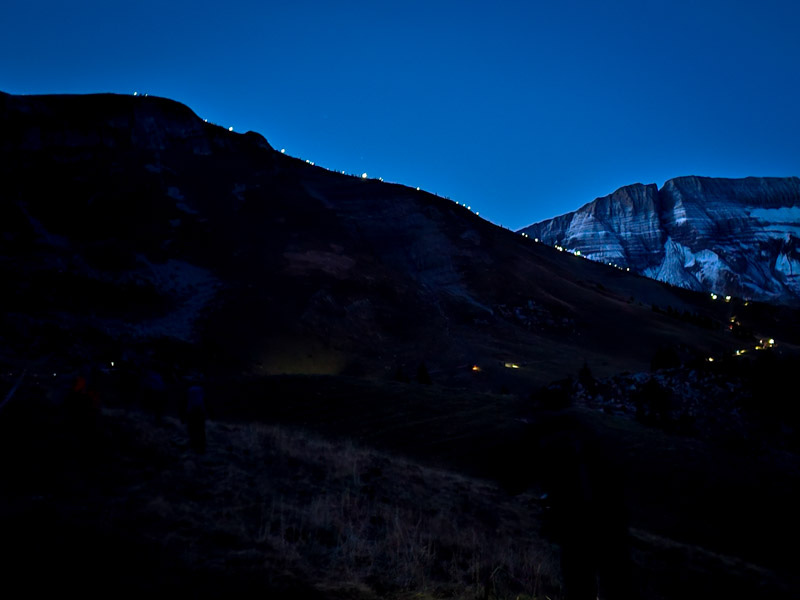

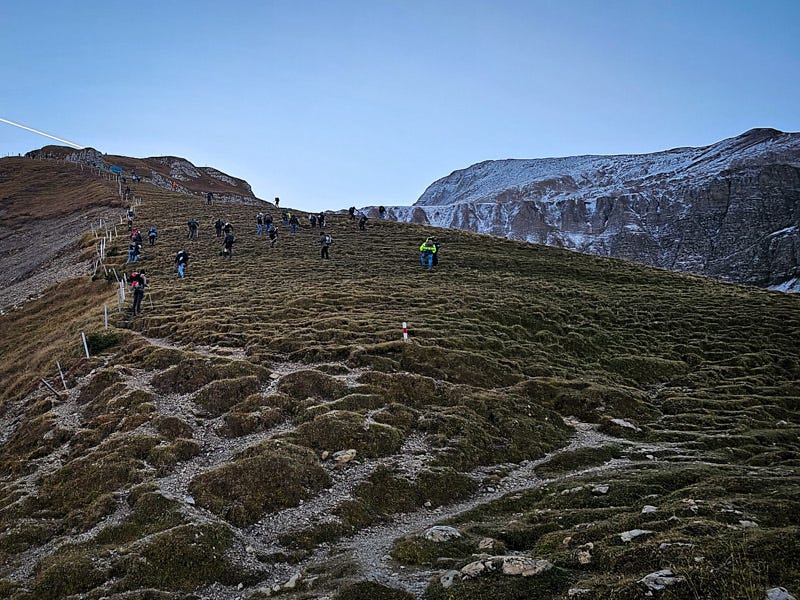
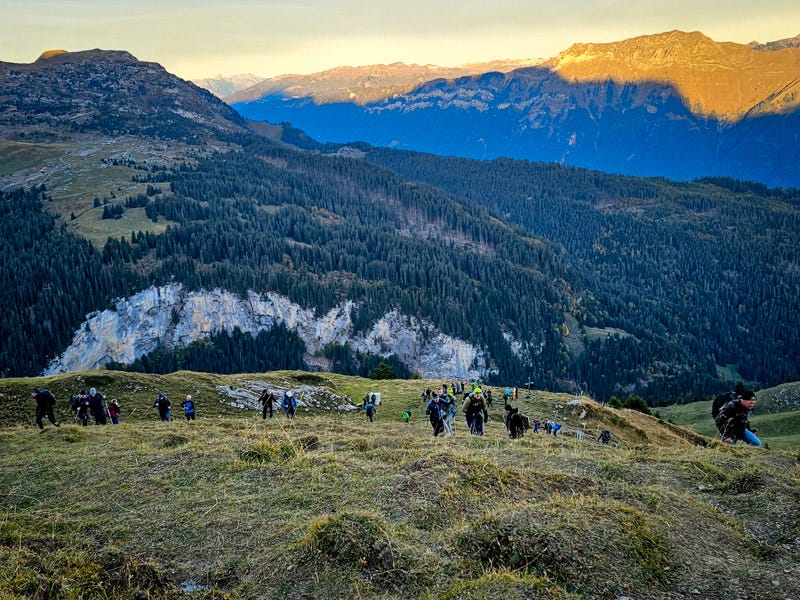
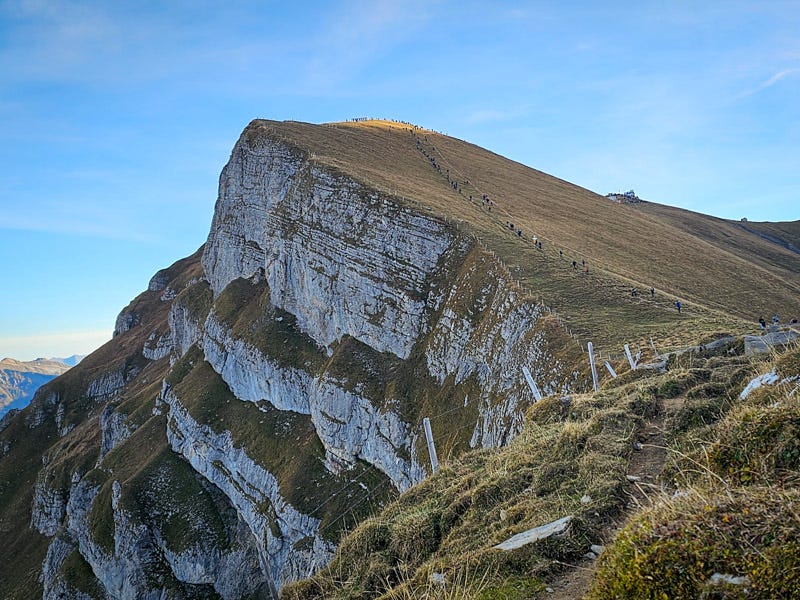
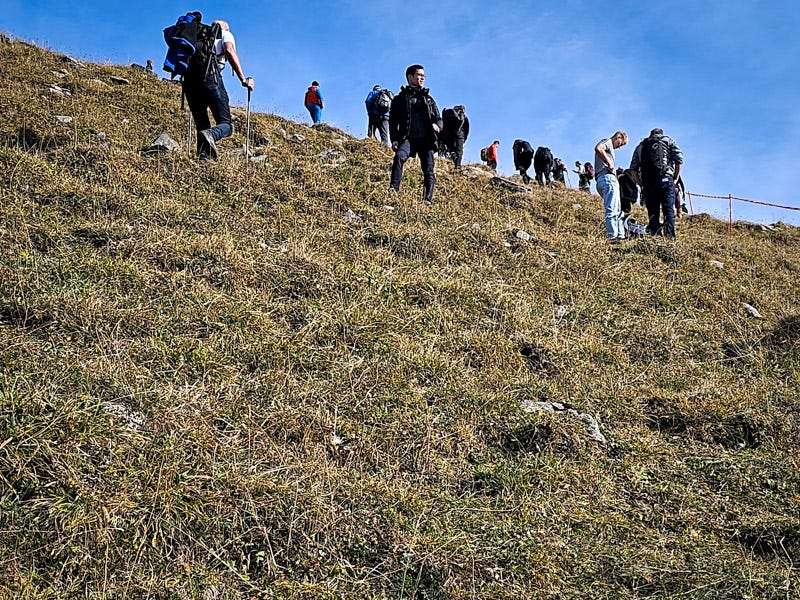
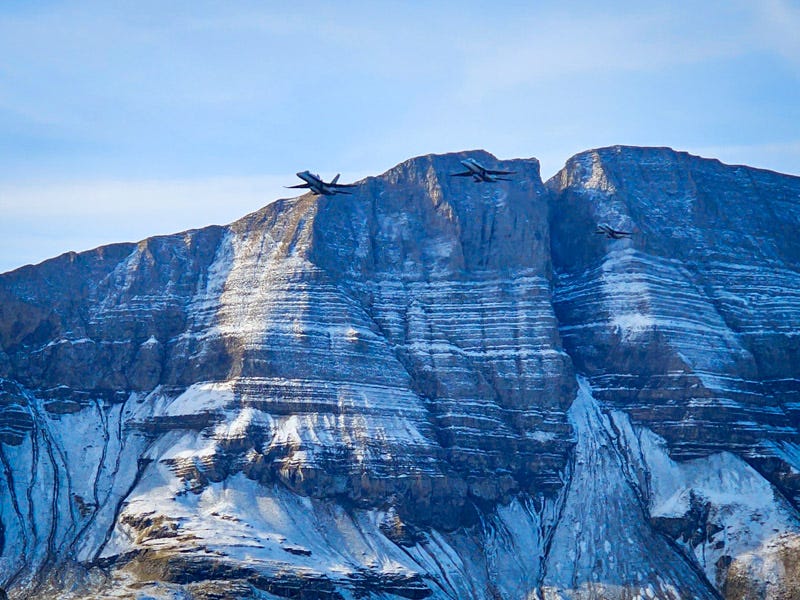
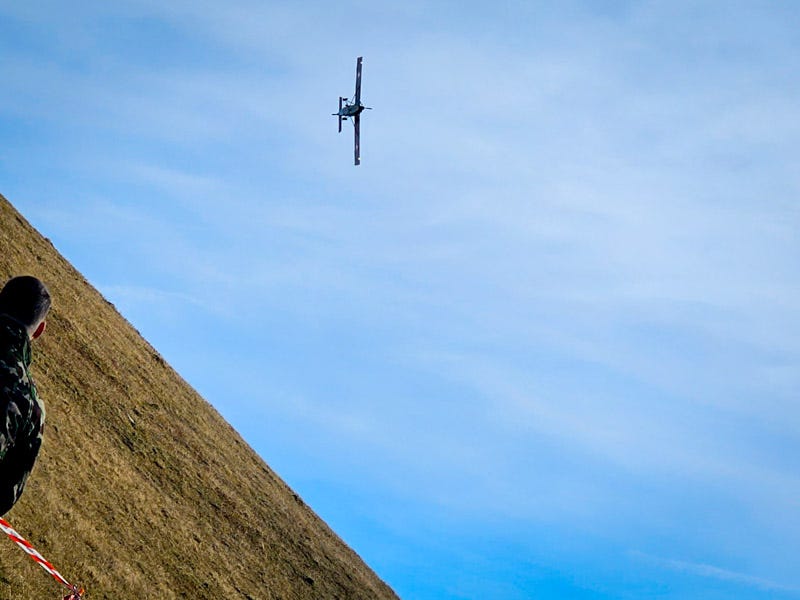
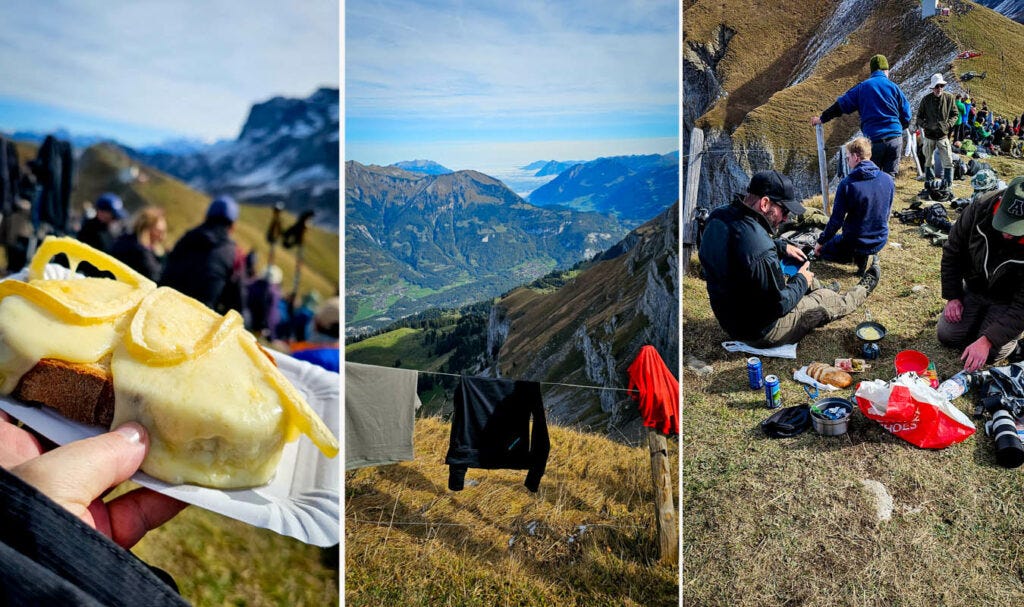
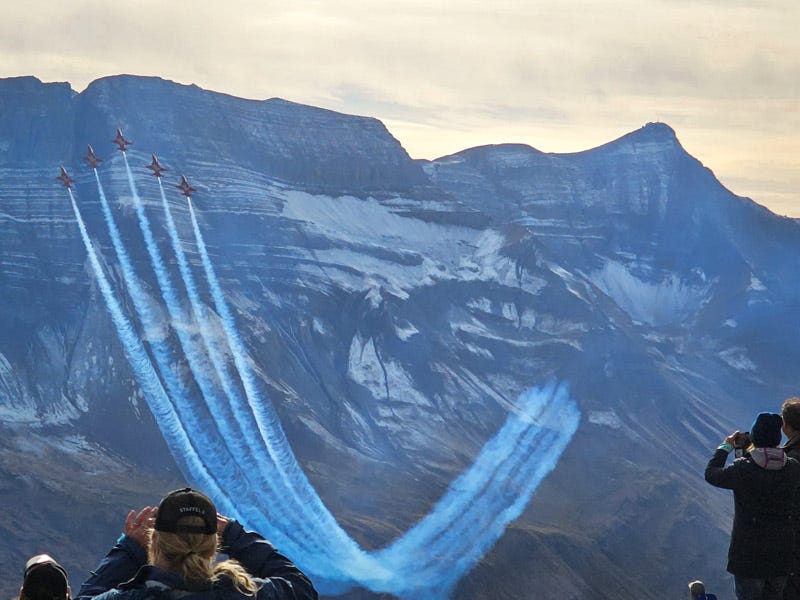
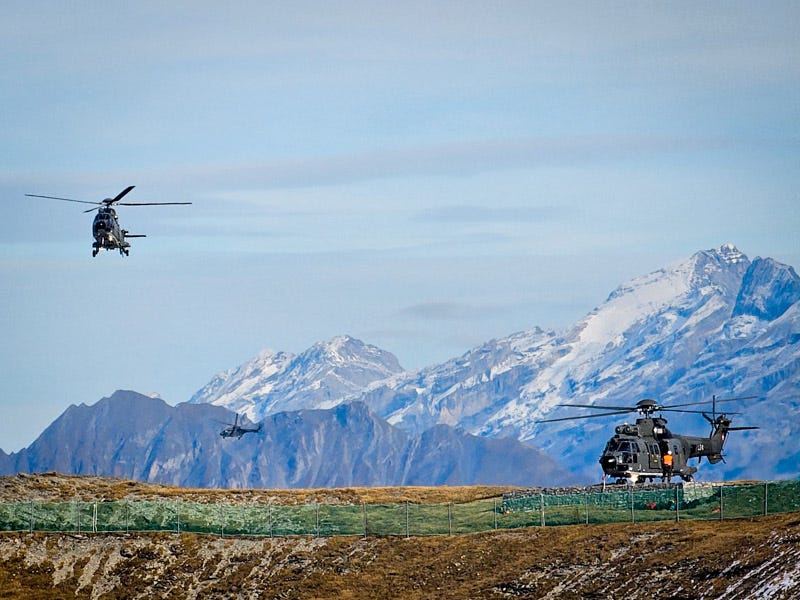
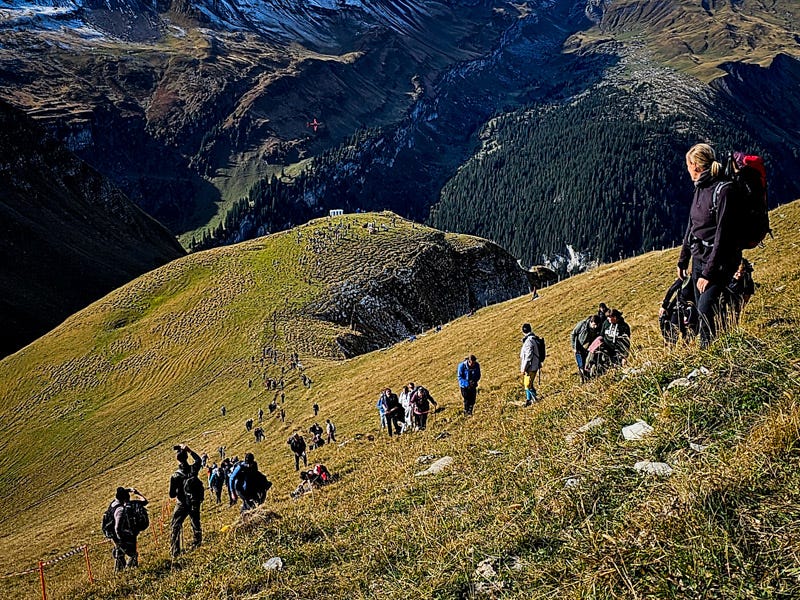
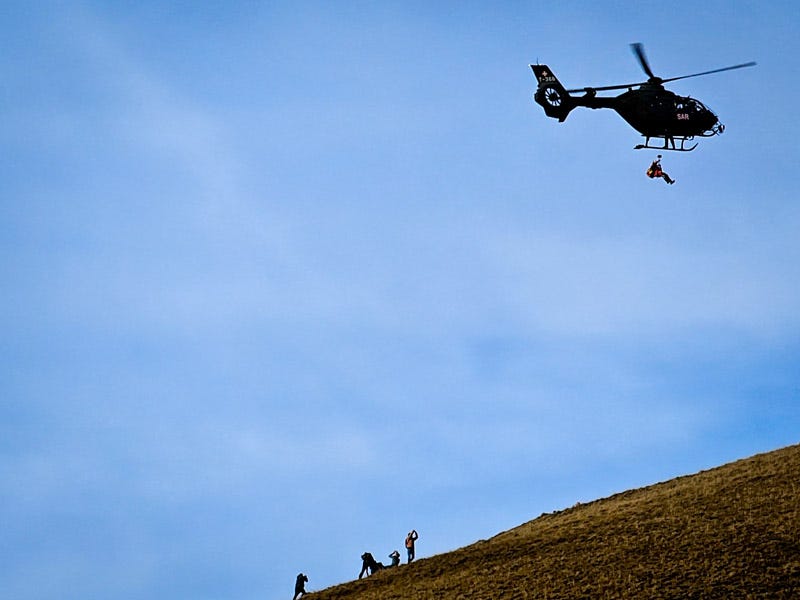
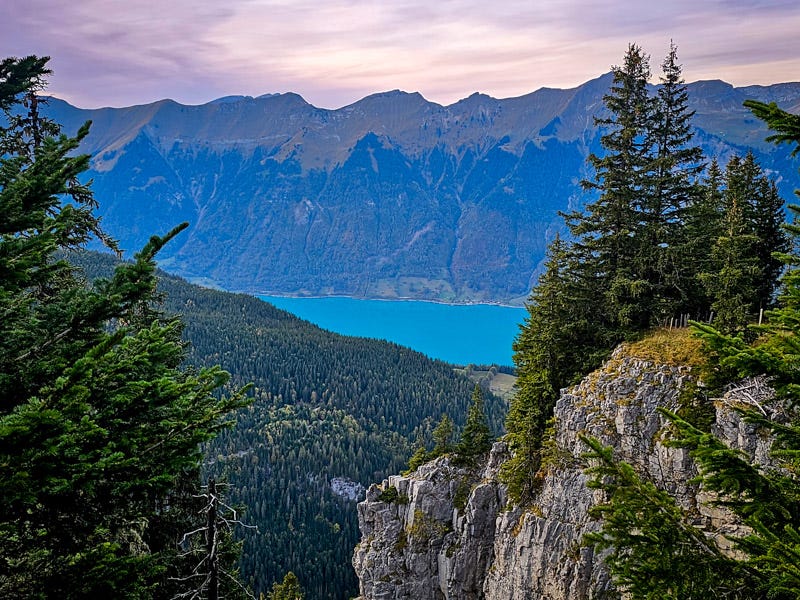
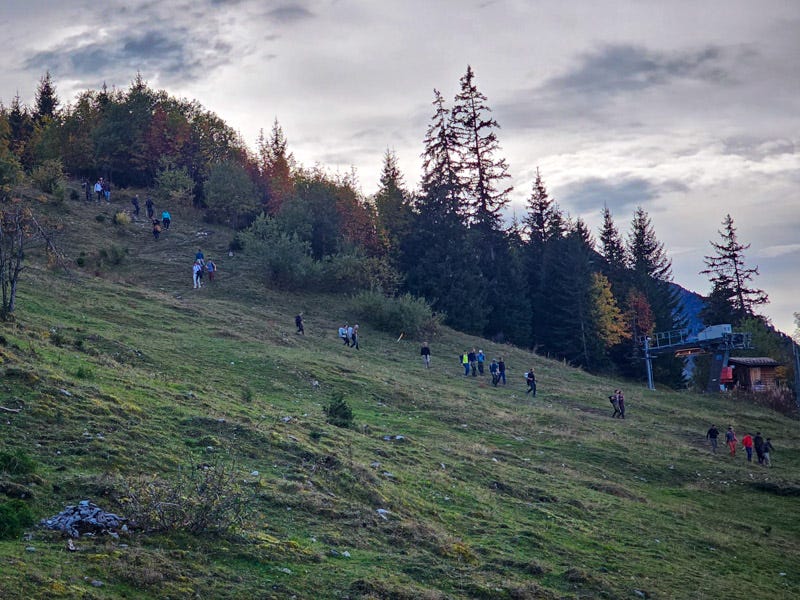
Oh wow! That was some adventure